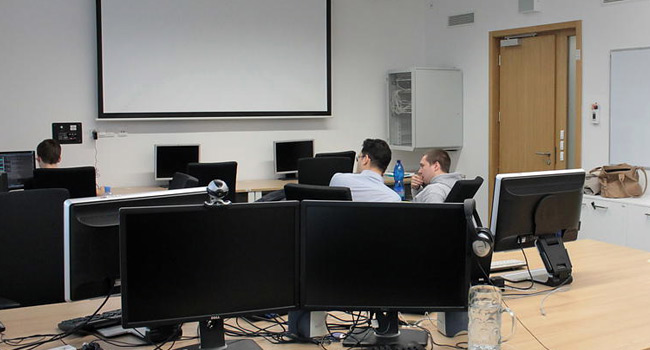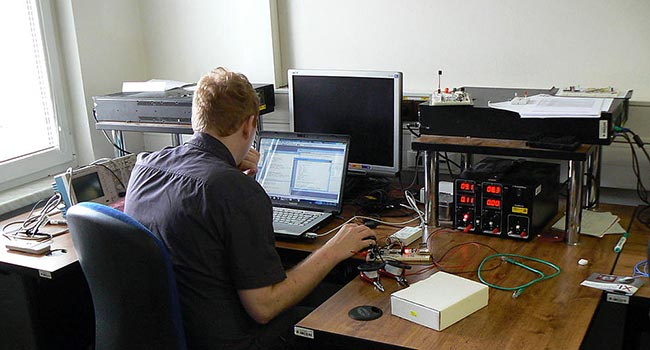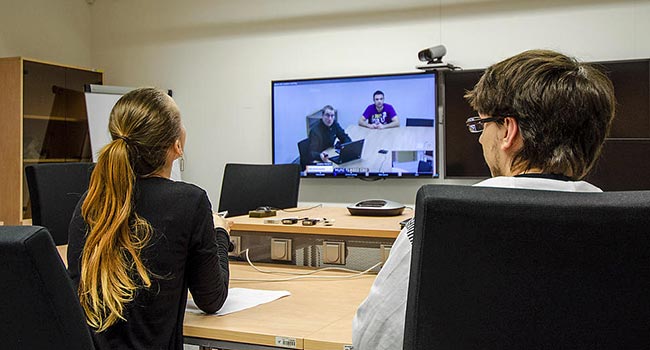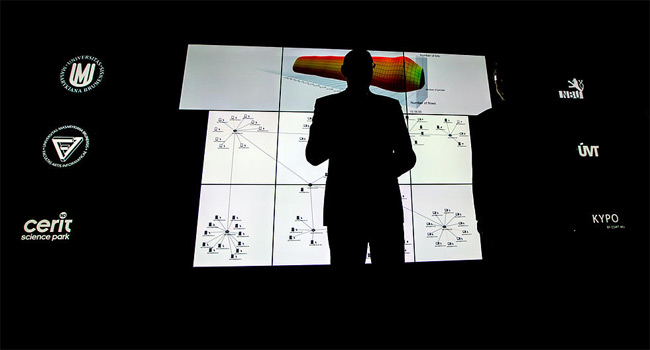Computer systems, communications and security
The curriculum will provide a good understanding of the architectures, principles, methods of designing and operating secure computer systems, taking into account both hardware and software aspects, including network communications.
The candidate chooses one of the specialisations of Chip Development Ecosystems, Information Security, Computer Networks and Communications or Software Systems.
| Czech study programme with lectures in English / English programme | |
|---|---|
| Form | Full-time |
| Duration of study | 2 years |
Graduate Profile
Graduates of the program will be prepared to design and operate secure computer systems, taking into account both hardware and software aspects, including network communications. The description of specialisations below provides more information.
Where to go after this degree?
Suitable follow-on FI PhD programmes:
- Computer Systems and Technology
Graduate career exploration
FI graduates are valued in practice, with an average gross starting salary of more than 50,000 CZK over the last few years, according to a survey of all degrees. More on graduate employability
Meet successful graduates

PhD wants to automatically monitor how websites comply with GDPR
Masaryk University graduate Karel Kubicek is working at the famous Swiss technical university ETH on automating the control of regulations concerning the handling of personal data.

Computer scientist from MU looking for vaccination dates
The system of Ján Jančár, a PhD student from the Faculty of Informatics of MU, searches and sends information about vaccination opportunities in Slovakia.

Reflective journal helps young teachers improve teaching
Beginning teachers at FI MU exchange experiences in the Teaching Lab and have developed a teacher journal that is finding applications beyond the faculty.

Where there is a will, there is a way
Blind software programmer Vojtech Polášek graduated from FI MU with honors and started his full-time career at Red Hat

Google didn't trust him at first. Then it appreciated him
Computer science student Vít Šesták was inducted into the Google Hall of Fame.

There is no one right time for business
The company of Petr Palas, a graduate of the Faculty of Informatics at MU, is based in Brno, but thanks to the Internet, his Kentico Software products are used by customers from all over the world.
In the study catalogue you will find lists of required and elective courses and a recommended course of study.
Internships are not a required part of the degree program.
Relevant research groups
- Centre for Research on Cryptography and Security (CRoCS)
- Laboratory for Quantum Information Processing and Cryptography (LQIPC)
- Laboratory of Digital Systems Design and Architecture (EmLab)
- Advanced Network Technologies Laboratory (SITOLA)
- Laboratory of Software Architectures and Information Systems (Lasaris)
- Cybersecurity Laboratory (KYPO)
Specialisation
Specializations are curricula that set out the requirements for graduation, such as required courses.
Chip Development Ecosystems
The specialisation Chip Development Ecosystems provides specific knowledge for working with programmable structures extending to parallel and distributed systems, computer networks and cryptography. The curriculum emphasizes a balance of courses providing the necessary theoretical foundation and courses focused on practical skills in which students participate in the design, implementation, analysis, testing, and operation of embedded systems. Project work with a small team focused on experimental and prototype solutions to interesting problems related to practical problems arising from the faculty's research and development activities is also an integral part of the course.
The graduate of the specialization will be ready to design solutions to practical problems using computer hardware, creatively modify hardware systems and deploy them, find employment in the following positions: embedded systems developer; hardware systems designer and analyst; single-chip microcomputer programmer.
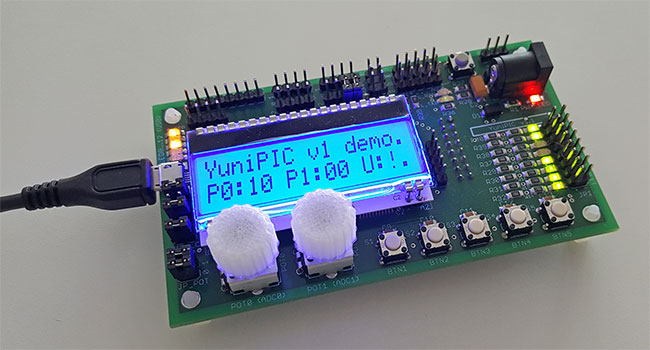
Information Security
Specializes in the areas of computer system and network security, cryptography and its applications. The aim is to prepare a graduate who will be able to work in a range of roles that are critical to ensuring the security of IT-specific profiles (e.g. towards cryptography, technological aspects or security management). Study beyond the common core and specialisation is left to the student's choice.
Graduates of the specialization will find employment in companies developing or delivering systems that take into account security requirements, as well as in advanced management and operation of such systems, among others in the following positions: security software or hardware developer; security and vulnerability analyst; systems security testing and evaluation specialist or security incident response specialist.
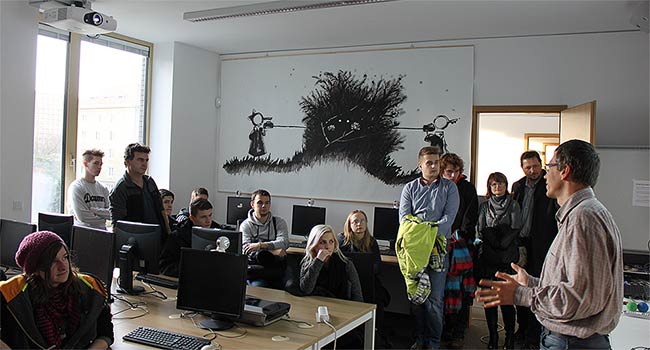
Meet the successful graduate
Award-winning computer scientist trains computers to recognize humans by their gaitGraduate Michal Balazia has received the prestigious Joseph Fourier Award for the development of a biometric system.
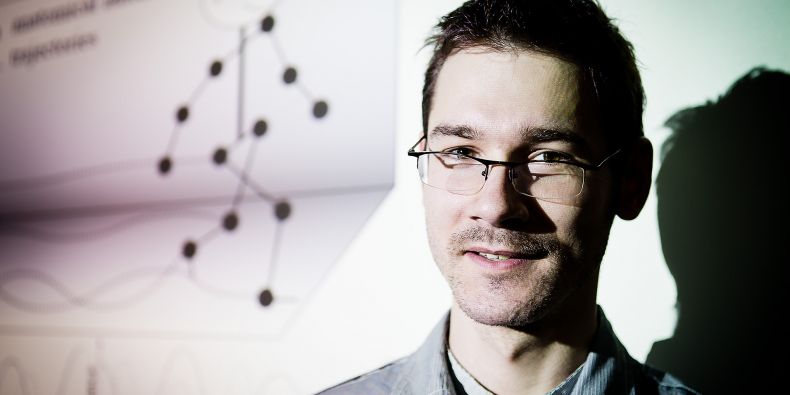
Information Security Double Degree Cagliari
This specialization leads to the double degree (from Masaryk University as well as from the University of Cagliari), the student must spend at least one semester with each university, and the final semester with the university where her/his Master thesis will be supervised and defended. Funding is provided solely with standard Erasmus+ support or research projects where the student is involved, at the moment no special stipends are available.
The specialization covers the same areas as the Information Security specialization - computer system and network security, cryptography and its applications. The aim is to prepare a graduate who will be able to work in a range of roles that are critical to ensuring the security of IT-specific profiles (e.g. towards cryptography, technological aspects or security management). Study beyond the common core and specialization is left to the student's choice.
Graduates of the specialization will find employment in companies developing or delivering systems that take into account security requirements, as well as in advanced management and operation of such systems, among others in the following positions: security software or hardware developer; security and vulnerability analyst; systems security testing and evaluation specialist or security incident response specialist.

Computer Networks and Communications
This specialisation focuses on acquiring advanced knowledge of the architectures, principles of operations and principles of computer networking. The specialization is designed to satisfy both those interested in practically oriented advanced information and knowledge of computer networks and their applications, as well as those interested in a deeper introduction to the theoretical foundations of the field and the study of computer networks as a special case of distributed systems. In addition to knowledge in the field of computer networks, the student will gain knowledge of security, principles of working with multimedia data, basic knowledge in the field of parallel systems and the necessary theoretical background.
The graduate of the specialization will be able to work, among others, as a Network Analyst; Network Engineer; Network Applications Engineer.
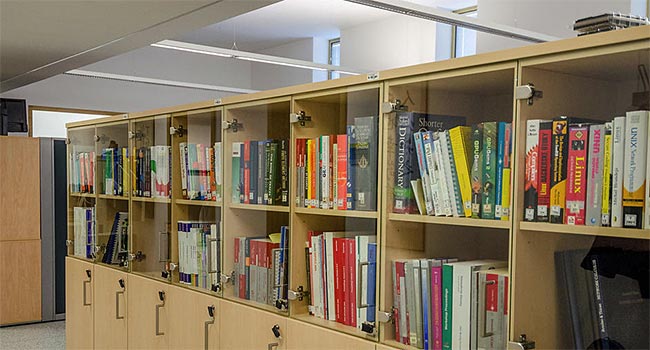
Software Systems
The specialization orients the graduate to the knowledge and skills needed in all stages of development and modification of large-scale software systems, especially information systems. Emphasis is placed on the knowledge required to design and develop systems with deployed modern software technologies.
Graduates of the specialisation will be able to perform various roles (e.g. Systems Software Developer; Enterprise Systems Developer; Cloud Systems Engineer) in IT departments involved in the development and operation of information systems and in the use of IT for the activities of organisations.
